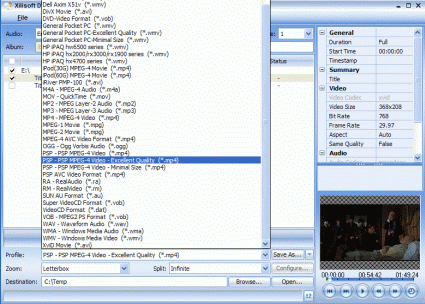All You Need To Know About Ripping DVDs
Sooner or later, you're going to need to rip a DVD. Mary Branscombe provides some tips for how to get the job done right and avoid getting scammed for ripping software.
Introduction
Ripping your music CDs to MP3 changes everything. Instead of juggling CD cases and spending time hunting through the bookcase for the CD with the one track you really feel like hearing, you can choose from your entire music library and enjoy it instantly on your desktop computer or portable media player. You get your content when, where and how you want it. And since making a copy for personal use is generally legally acceptable, so there's plenty of software available.
Things are not as simple when it comes to ripping DVDs, however. For one thing, the DVD video format is more complicated. Each track on a CD is a WAV file that you can copy or convert, but the content of a DVD is divided into multiple VOB files for the video, with separate audio tracks and a menu system. The menus let you navigate through the video scenes and access alternative soundtracks, captions, camera angles, audio commentaries and extra content.
The files required in DVD ripping are much larger, especially on dual-layer DVDs, and the conversion is a more complicated process. Video processing is also very CPU-intensive; it could take you a full 24 hours to copy a DVD on a 500 MHz PC, while even a 2 GHz processor will take three or four hours to do the job. And while the version you watch on your PC or media player will be a much smaller file than what's on the DVD, you'll still need up to 10 GB of free space for the files during the ripping process.
For commercial DVDs, there are other considerations including the copy protection on the discs, and the legality of copying the content (even for personal use). Some of the most famous DVD ripping software is also no longer available legally, although bogus similarly-named versions abound. And finally, not all of the DVD copying software you can buy will work with commercial DVDs.

DVD Ripper Platinum converts video to the right codec and resolution for a wide range of portable media players.
Copying DVDs isn't about piracy - you might just want to make a backup. Because while DVDs are physically robust and long lasting, they're no match for a small child with a jar of peanut butter. Playing the same DVD over and over again doesn't damage it, but the disc can pick up dust and minute scratches as you take it in and out of the case. Enough of them can make DVD playback jump, or more often, stop altogether. (By the way, don't store a DVD horizontally, leave it on a sunny window sill, or keep it in a CD case; the central hub fits the disc too tightly and can damage it).
In some rare cases, the layers of the disc can separate - this is called delamination - or spots of corrosion can appear. Although these are grounds for getting the disc replaced, that's not always possible or worth the time and hassle.
Sign up to get the BEST of Tom's Guide direct to your inbox.
Get instant access to breaking news, the hottest reviews, great deals and helpful tips.
In addition to backup, the video iPod and similar devices allow you to watch videos in smaller and more convenient forms than portable DVD players. And while Media Center PCs always have DVD drives, you still have to physically change DVDs to watch something different. Finally, if you play a DVD on your laptop on a plane trip, you run down the battery faster because you're accessing both the DVD and hard drives.
But convert the video on a DVD to an AVI, DivX, or other alternative file format and you can watch it in far more places. You could store the files on a server or NAS device, and watch them on any PC in the house without having to fetch the disc from another room (and without being restricted to PCs that have DVD drives.) You can also take several DVDs with you without lugging around extra weight and bulk.
Note, however, that ripping a DVD to another format reduces video quality. You can't expect the same detail or resolution, and you'll usually lose DVD special features and extra content. But on a smaller screen, or in situations where you couldn't use even a portable DVD player, you may feel the compromise is worthwhile.
Mary Branscombe is an experienced freelance journalist, editor and author, who has been writing for more than three decades. Her work has appeared in The Financial Times, The Guardian, Tom's Guide, and many more. She has also written several novels — including the Cassidy At Large technomysteries — and two IT guides alongside her writing partner, Simon Bisson.
